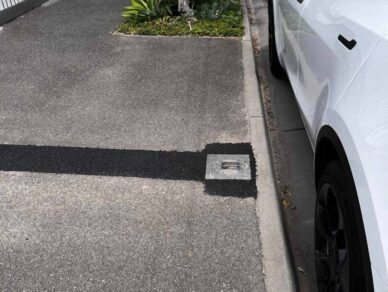For retiree Donna Ashton and her husband Peter, having a Tesla Y electric SUV has been fantastic. The only issue? Public charging.
“A lot of these chargers were either not working, or people were sitting in them far too long instead of just using them as they’re supposed to,” Ashton told The Driven.
“What we found was more frustration than anything else.”
The two retirees did not have off-street parking, so they decided to install a private kerbside pop-up charger – one of only a handful in the country – in front of their Melbourne house to solve the problem, at an eyewatering cost of $7,500.
But council approval suggests that this may become more common in areas without off-street parking.
“We’re really happy with it,” Ashton told The Driven. “I think it’s one of the best decisions for us. Yes, it’s a little bit expensive at the moment, but honestly, it’s about the convenience.”
The charger, purchased from a company called Kerb Charge, has rated to 7 kilowatts and retracts into the ground and locks when not in use. Another feature is that a loud alarm goes off if someone was to tamper with the charger while it’s charging a vehicle.
“I have accidently set it off,” Ashton laughs.
“It gives a warning, loud beeping noise, but if you keep at it it goes for until you fix it.”
The couple, who live in a heritage house in Melbourne, do not have off street parking and were getting frustrated with chargers in the area that were broken or in use.

But without throwing a cable over the fence and to the car (which is illegal) the options for charging if you don’t have off-street parking are limited to public chargers.
The Ashton’s home happened to be in the Port Phillip council area though, which is currently undertaking a pilot program to install private kerbside EV charging systems through Kerb Charge.
It is the only council in Australia allowing this type of private kerbside charging infrastructure.
The costs included $1,300 for an electrician to install an isolation switch on the house, less than $1000 for fees to the council, and $5,000 for the equipment and installation of the charger (including digging up the sidewalk to lay the cables) and so ended up at about $7,500.
But for Donna and Paul, it’s been worth it.
“Since we’ve got the charger in, people walking past the house and see the car charging are asking us lots of questions about it,” said Ashton.
“It gives them more information about whether they’ll purchase an EV when they can see you can get this sort of infrastructure put in place.”
The parking space with the charger in front of it isn’t exclusively for the Ashtons’ use, but with the street being mostly permit parking, they usually don’t have to worry about the park not being available.

“Occasionally people park there but, it’s not as if we have to charge every day,” said Ashton.
“So, when they move, you just go back and park in front.”
They normally charge during the day, and in the month they’ve had it installed they haven’t had any issues.
Although areas in New South Wales have installed public kerbside chargers in a number of council areas, private kerbside chargers are still few and far between.
However, with the Port Phillips trial wrapping up, this could provide incentives from other local councils to set up their own regulation for private pop-up chargers. Hopefully, at a slightly cheaper price point.

